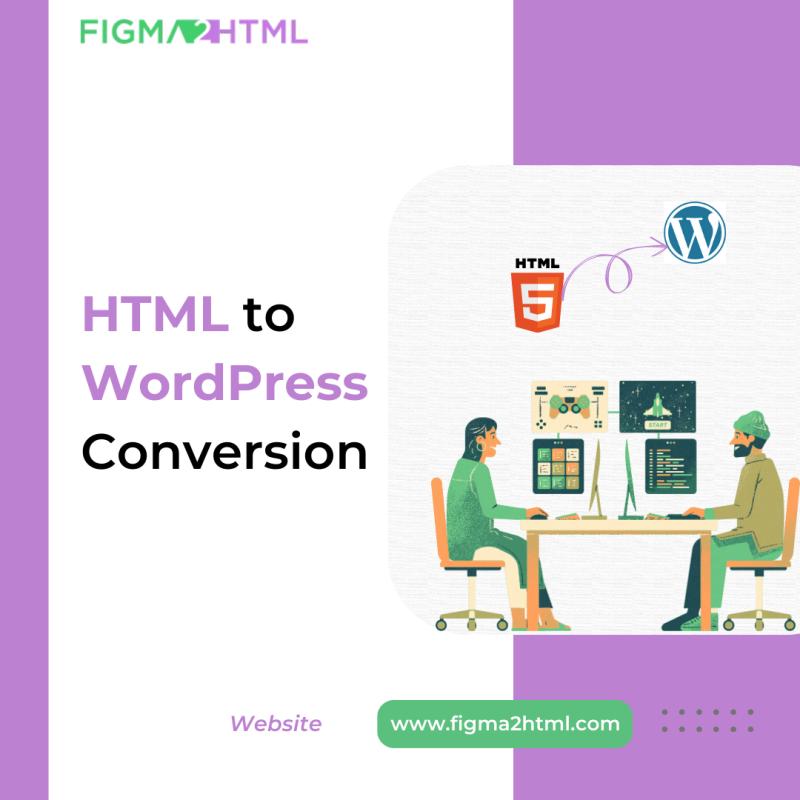HTML vs. WordPress: Why Making the Switch Can Skyrocket Your Website

In today’s digital world, the platform you choose to build your website can significantly impact your business’s growth, user engagement, and overall success. Two popular options for building a website are HTML and WordPress. While HTML offers simplicity and control, WordPress has evolved into a dynamic, feature-rich platform that offers businesses greater flexibility and scalability. If you’re still running your site on HTML, it might be time to consider the switch. Here’s why making the move from HTML to WordPress can skyrocket your website.
The Case for HTML: Static and Customizable, but Limited
HTML, or Hypertext Markup Language, is the foundational building block of the web. It’s a reliable way to structure content, from headings and paragraphs to images and links. If you’ve designed your website with HTML, you have complete control over its layout and appearance. You can achieve a highly customized, unique look, especially if you have design skills or a developer to help you.
However, HTML websites come with significant limitations. Managing content can become cumbersome, especially when your website grows and you need to make frequent updates. Each change requires manual editing of the code, which can be time-consuming and prone to errors. For a simple website that doesn’t need frequent updates, HTML might suffice. But for growing businesses looking to stay competitive, switching to WordPress opens up a whole new world of opportunities.
Why Switch from HTML to WordPress?
1. Ease of Content Management
One of the main benefits of WordPress over HTML is its user-friendly content management system (CMS). With WordPress, you can easily add, edit, and manage content without needing to touch any code. Whether it’s writing blog posts, uploading images, or creating new pages, WordPress allows you to make these changes with just a few clicks.
For those who want to focus on running their business rather than worrying about code, WordPress offers a major advantage. Unlike HTML, where you might need to hire a developer every time you want to make a change, WordPress empowers business owners to manage their website content independently.
2. Scalability and Growth
As your business grows, so should your website. A simple HTML website can be limiting when you want to expand, whether you need to add more pages, integrate new functionality, or set up an online store. In contrast, WordPress offers unmatched scalability. With thousands of plugins and themes available, you can easily add new features such as contact forms, social media integrations, SEO tools, and e-commerce capabilities.
Switching from HTML to WordPress enables your website to grow alongside your business, without requiring a complete redesign or expensive coding changes. WordPress allows you to effortlessly scale your website to meet evolving business needs.
3. Search Engine Optimization (SEO)
SEO is crucial for driving organic traffic to your website. While HTML websites can be optimized for search engines, it often requires manual effort, coding knowledge, and ongoing adjustments. On the other hand, WordPress is designed with SEO in mind, offering numerous tools and plugins to streamline the process.
With plugins like Yoast SEO, WordPress users can easily optimize their content, generate meta tags, track keyword rankings, and manage other on-page SEO factors. The simplicity of SEO optimization in WordPress makes it an ideal choice for businesses looking to improve their online visibility and drive traffic to their website.
4. Mobile Responsiveness
In today’s mobile-first world, ensuring your website is optimized for mobile devices is a must. While it’s possible to make an HTML website mobile-friendly, doing so requires manual effort and knowledge of responsive design principles. WordPress, however, offers many themes that are built to be responsive by default. This means your site will automatically adjust its layout to look great on desktops, tablets, and smartphones without extra work.
Switching from HTML to WordPress gives you peace of mind that your site will deliver an optimal experience for all users, regardless of the device they’re using.
5. Security and Regular Updates
Security is a major concern for website owners, especially as cyber threats continue to evolve. A key advantage of WordPress over HTML is its security features and regular updates. With HTML websites, security patches need to be implemented manually, and maintaining security standards can be cumbersome.
WordPress, on the other hand, is regularly updated with security patches and improvements. Additionally, there are a variety of plugins available to enhance website security, including firewalls and anti-malware tools. This means that WordPress offers a more secure, automated approach to protecting your site compared to a static HTML website.
How to Convert HTML to WordPress
If you’re convinced that the benefits of WordPress outweigh those of HTML, the next step is to convert your site. This transition might seem daunting, but it can be made easy with the right tools and expertise.
You can start by using an HTML to WordPress service, where professional developers handle the migration for you. Here's how the conversion process typically works:
Design Review and Planning: Review your current HTML website and assess what needs to be transferred to WordPress. Consider the functionality you’ll need, such as forms, galleries, or e-commerce features.
Choose a WordPress Theme: Select a theme that matches the design and structure of your HTML site, or work with a developer to create a custom theme that suits your needs.
Migrate Content: Transfer your text, images, and other media from the HTML site to WordPress. This can be done manually or using specialized migration tools to streamline the process.
Integrate Plugins: Install the necessary plugins to add functionality to your website, such as SEO tools, contact forms, and security features.
Test and Launch: Once the conversion is complete, test your new WordPress site across different devices and browsers to ensure everything works as expected.
Ongoing Maintenance: WordPress sites require ongoing updates and maintenance, so ensure you’re regularly updating plugins, themes, and WordPress itself to keep your site secure and functional.
Why Use an HTML to WordPress Service?
If you're not familiar with the technical aspects of the conversion process, using an HTML to WordPress service can save you time and hassle. Experts in website migration ensure that your content, design, and functionality are seamlessly transferred to WordPress, with minimal disruption. This professional service ensures your site remains fully optimized and ready to perform better than ever.
Conclusion: Make the Switch and Watch Your Website Thrive
In the battle of HTML vs. WordPress, WordPress clearly offers a wide range of advantages for businesses looking to scale, improve content management, and boost online visibility. By switching from HTML to WordPress, you gain access to a powerful, flexible platform that empowers you to grow your website and your business with ease.
Whether you’re looking to improve SEO, add e-commerce functionality, or ensure your site is mobile-friendly, WordPress has the tools you need. And with services that help you convert HTML to WordPress, transitioning has never been easier. Embrace the future of web design and make the switch today to skyrocket your website’s potential.
Post Your Ad Here

Comments